In recent weeks, I’ve found myself being asked the same question a lot of people lately. “Are you getting an Xbox One or PS4?” When you work with video games as a profession it’s a pretty difficult question to avoid. It is with some disdain that I honestly answer “Neither” each time I’m asked. This has nothing to do with console favouritism, or a misconstrued PC superiority complex. My choice to not partake in “Next Generation” console gaming comes down to a few conflicting factors, many of which I would imagine could be similarly felt by the wider gaming community.
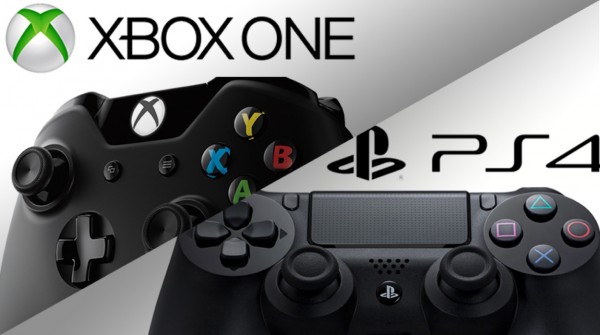
The question itself implies that you have to be in one camp or another or else: ‘YOU AREN’T A REAL GAMER!’ Even after playing games for over 20 years, I’ve felt like less of a gamer when I say that I would be getting neither the XBO nor PS4 in the immediate future. I sometimes use the high price point to help justify this choice (even though I bought a Wii U a few months back), but in all honesty I just don’t feel like I would enjoy what either console has to offer. I realize that it’s still early days for both systems, as they haven’t even seen their first Christmases yet. However there was something I noticed about the launch lineups for both systems that retailers and paid advertisers describe as “impressive”. For the most part, many of the “Awesome next-gen launch titles” were simply graphically updated ports of games that had already been released on the previous generation consoles. It doesn’t say much for the launch and potential if the best things that the consoles are advertising themselves on are Fifa 14, COD: Ghosts and Assassin’s Creed IV. Sure there’s a few original IP’s in there, but for the most part, these launch lineups really seem to be lacking what new console generations should be inspirited to create: NEW original games and properties.
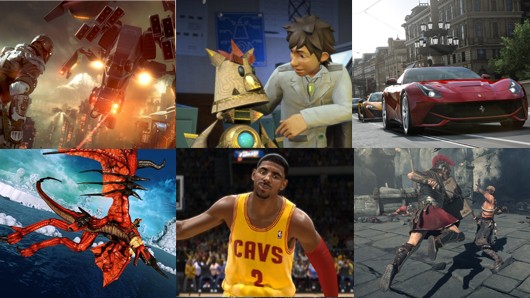
Wouldn’t be an issue if this wasn’t ALL of the original content on offer…
I’ve done a bit of research and a count of the week one retail launch lineups of both consoles. Of the 18 Xbox One titles and the 15 Playstation 4 titles, only TWO XBO titles and ONE PS4 title were NOT sequels or ports of games that had already been released on previous systems. Ryse, Powerstar Golf and Knack are the only original properties to have graced the systems thus far. Pretty eyebrow raising stuff, no? Where’s the originality disappeared to? All indicators point to the industry’s obsession with churning out sequels as the cause. Why do developers and publishers keep making new installments and slapping an extra number or subtitle to the name? It’s a pretty simple answer actually: Because they sell. Everything is in the brand name. A Fifa game will always sell to football fans, The Sims expansions will sell to simulation fans and Assassin’s Creed will sell to sandbox fans. From a business standpoint this makes pretty clear sense. Taking on lower risk ventures with predictably high profit results is Business 101. Creating new IP’s involves some pretty substantial risk of not selling, and demands a lot more groundwork establishment than the tried and true franchises. Sequels, with their pre-established characters, settings, and gameplay mechanics are also more time-efficient to produce. “No need to worry about introducing and explaining the story of the hero and villain, they’ve been at it five times already!”
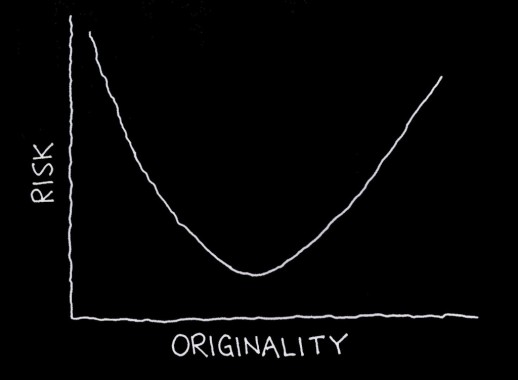
This complicated graph explains everything!
I use the term ‘Sequelitis’ to describe this condition of the industry at present. Besides being the name of a hilariously insightful Egoraptor webseries, the term refers to the idea that within creative media, a constant cycle of sequel releases creates creative stagnation. This is true of all forms of creative media, including films, music, television shows, and yes, video games. Ask yourself, when was the last time you enjoyed a genuinely great ORIGINAL game, let alone as a full retail release? The last one I can recall was Dishonored, and before that it would have been the first Dragon Age game. That’s at least two years in between releases. In the time between, almost all of the games that frequent most gamer’s collections seem to be a sequel, prequel or spinoff in an already established franchise.
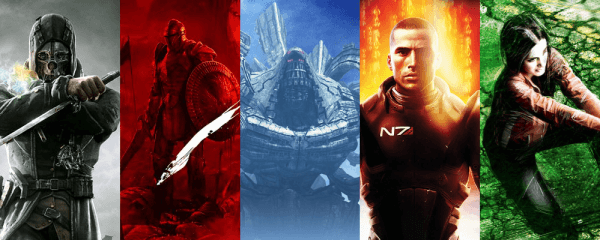
Some standout examples of original titles of the last generation (Dishonoured, Dragon Age, Xenoblade Chronicles, Mass Effect and Left 4 Dead)
Not often enough do we seem to stop and look at what this mentality of ‘rinse and repeat’ is doing to the creative drive of the industry. By placing a business (rather than creative) emphasis on the production of video games, fewer and fewer developers and publishers will be inclined to take that new IP risk. Of course game production ultimately has to be run as a business to generate revenue, and a few sequels will always be in demand, but 16 out of 18 launch titles is taking the piss. I do not write this article to disparage and nay-say what gaming sequels bring to the industry. They generate billions of dollars in the industry every year and many have been revolutionary names with powerful fan followings. Heck, many of my favorite game releases have been sequels: Mass Effect 2, Elder Scrolls III-V, the Halo series, Legend of Zelda and Pokémon of all generations. Many of these are some of the best ever made. Like movies and television shows, sequels in games can be an extraordinary mixed bag of quality. Some are poorer shadows of their original title, others are extremely well developed expansions on the game’s universe, and others attempt to emulate expansion while really adding very little. It’s that third result that concerns us. The issue I want to draw out is the difference between expanding on the game universe and what’s essentially milking a cash cow.
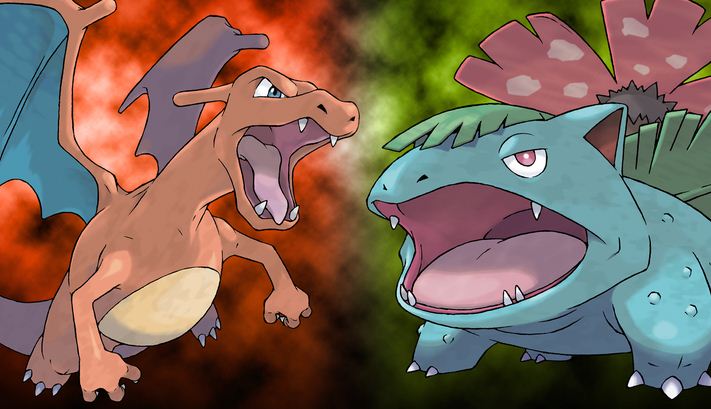
The yearly released sports titles and ‘modern’ shooters are the most guilty of perpetuating this trend. Now, by no means am I saying these are bad games. To sell so well all of the time, they have to be doing something really well in the design and marketing side of things. It is not the games themselves I wish to challenge, but the mentality of their production. These are the series and franchises that treat the smallest of additions to the game formula as the most groundbreaking gameplay mechanic ever. Case in point example: The dog in Call of Duty Ghosts, who appeared heavily in the marketing of the game but only showed up for action in two campaign stages. A lot of hype over very little delivery. If I were to ask you, “What was the difference between Fifa 11 and Fifa 12, or Modern Warfare 2 and 3?” I’d wager that many would have difficulty transcribing these thoughts into words. Most responses one might expect would be: “Different story? Updated rosters? Better Graphics?”
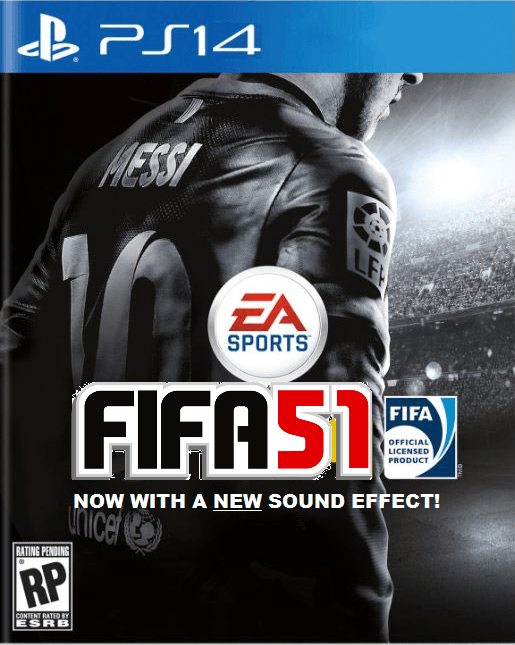
This will probably exist too…
It still astounds me how much hype gets made over the detailed level of graphics in modern video games. In earlier days, when games were extraordinarily more limited by the graphics technology of the time, successful games had to make themselves appealing on the basis of story or gameplay instead of how pretty it looked. Some of my fondest gaming memories involve nothing more than 16 bit pixel characters in Megaman X, Chrono Trigger and Sonic the Hedgehog. However, as time has progressed and as the business demand for everything to look pretty rather than play well has taken over the development process. Now we move into a console generation that promises to be the most “powerful” ever in terms of processing power. However, I guarantee that of all the new releases to come, at least 80% of a game’s processing power will be devoted to the graphics. And what sorts of games market themselves most on graphic improvement? That’s right. Sequels. That, and any Playstation game staring Ellen Page. You only have to look at the launch lineup to observe it. 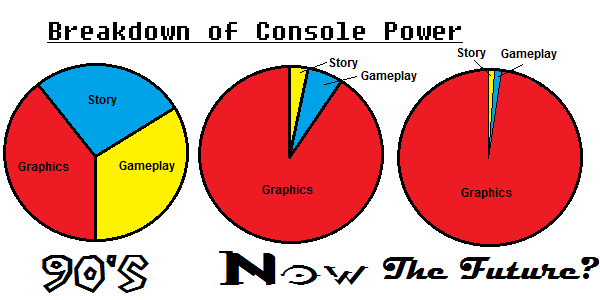
What’s wrong with this picture?
This is the part where I lavishly praise the independent video game development scene for their work. Many of the best original IP’s I’ve played in the last five odd years have been independent development projects released on Steam, Xboxlive and PSN. I’ve been quite pleasantly surprised at how much I’ve marketplace games like Castle Crashers, Super Meat Boy, Limbo and Dust: An Elysian Tale. These are the titles that tend to more commonly forgo multi-dimensional graphics in favour of superior gameplay. I’ve found that Steam, XBLA, PSN and the Nintendo Store have become havens for the original, and I encourage all Indie developers to continue their often groundbreaking work. I asked the question: “Will Next-Gen gaming suffer from Sequelitis?” Unfortunately, all of the evidence points towards “Yes”. The launch lineups and announcements of new titles are not encouraging for the future of console gaming. And considering that some of the biggest exclusive hype has been generated for new Halo and Infamous games, I don’t think we’re going to be seeing any more revolutionary genre defying IP’s any time soon. I sincerely hope that some of the upcoming release titles like Watchdogs and Destiny will start to break out of this trend, but toppling the “successful” rinse and repeat formula is going to take a lot of gamers to stand up and say “Seriously. No. More.”
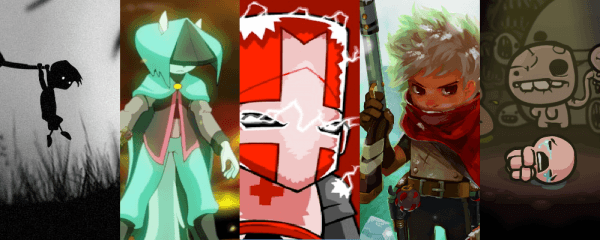
Some of the best games you’ll ever play are those not bought in a store. (Limbo, Dust: An Elysian Tale, Castle Crashers, Bastion, Binding of Isaac)
Of course, there are always those occasional entrants into the industry that really do defy these genre trends. Despite the relative sameness of most modern shooters, Spec Ops: The Line was an excellent example storytelling told through gameplay decisions. And it was an original title. Similarly, Xenoblade Chronicles on the Wii was an exemplary RPG title, again, an original IP. We know that it is possible to innovate in the modern market. They just need the backing of developers and fans to make it a reality. On that note, I’m not just writing this to rant about my own personal misgivings about the upcoming console generation. In fact, I offer a few realistic suggestions on how we might breathe a little bit more of that creative spark back into the mainstream industry. First and foremost, I should point out that we should not stop making sequels. Like I said before, some of the best games ever made were sequels. But what many of us notice about the most successful and enjoyable of them are that the best sequels are those that leave some time between releases. Extra time gives developers more creative freedom, because they are not under significant time pressure to get their project done. Remember when I said the yearly releasers are the most guilty? It’s because they are under pressure to meet that yearly release deadline. Not only does this stifle creative freedom, in the minds of the players it also makes the experience seem all the more bland.
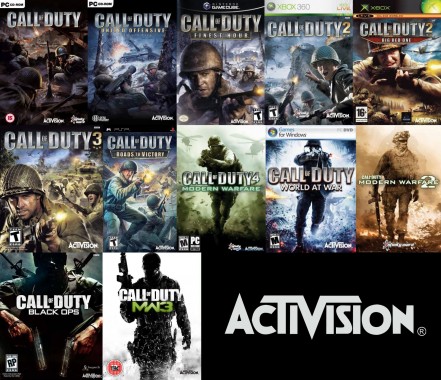
Every. Freaking. Year.
Remember, game development takes time and care. Make the demand for franchise releases less frequent, and you grant the developers more time to come up with some truly great ideas. While the onus is on publishers to not pressure the development teams in this regard, this can be helped along if we consumers learn a little patience and stop sending in letters and emails asking “OMG WHEN IS THE NEXT ONE COMMIN’ OUT LOL!?” Having appropriate time to finish games properly can really make the difference between your Skyrim epics and your Mass Effect 3 rushed ending. Personally I love the sequel series like Elder Scrolls and Smash Brothers. But these franchises are so appealing because their development takes time, with around 4 or 5 years between releases. I guarantee many of you would become significantly less interested in them if they were to be released every year. This is advice I aim towards games like Assassin’s Creed and Call of Duty. I challenge these developers to just take an extra year in making your next entry, and see where it takes you.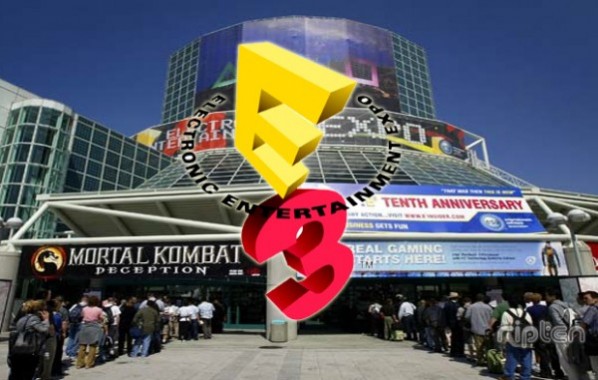
E3: Supporting or Killing Originality?
Secondly, we really need to address the overhype that exists around these yearly released sequels. It’s very surprising how so few players have played, or even heard of outstanding titles like Shadow of the Colossus, Grim Fandango or Psychonauts. It’s because the yearly re-releasers tend to get all the huge marketing hype and attention. I suggest that we aim, not to cut off, but at least reduce the overhype from its source. And you don’t get much more gaming overhype than at E3. E3 in the many years gone past was the premiere gaming expo that aimed to show off the latest in gaming innovations, both for hardware and software. Recently however, the expo has developed a bit of an “over-rated” reputation in the gaming community. It’s become something of a springboard for developers to showcase new installments as opposed to new franchises. I’m sure many would agree that E3 would be a richer experience if there were more originality to be shown. My suggestion in this regard is to make E3 all about new IP’s and new ideas. In other words, ban sequels from E3. Now, this is not to say developers should stop making new games in their pre-existing franchises. Heck, I support it. But if developer entry into E3 came with the proviso “No Sequels”, we would see a huge wealth of innovation. Imagine if every title on the showroom floor was an original IP. This would generate some much needed attention for these creations, and drag it away from the yearly re-releasers. EA wants to announce a new Battlefield game? Ubisoft, a new Assassin’s Creed? Great, but announce it any other time of the year, with your own marketing on your own website. Let’s start celebrating and supporting the prospective new franchises, and not just the same old same old.
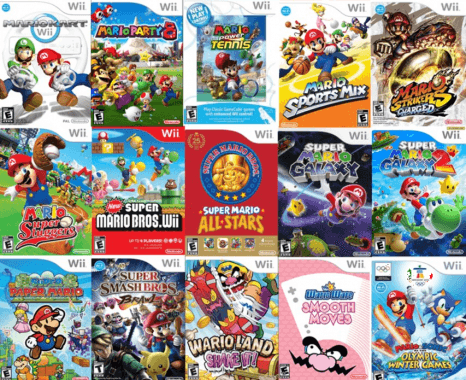
Not so much sequels as spin-offs.
A third suggestion I would make would be to mix up the formula of the annual re-releases a bit. You may have noticed that not once yet have I berated the Mario franchise for its bout of Sequelitis. The difference I see in the Mario franchise however, in comparison to say Assassin’s Creed, is that each successive Mario title’s gameplay formula is mixed up just enough to keep it appealing, and not feel immediately repetitive. If asked to describe Assassin’s Creed I-IV, they’re all very samey in terms of formula and gameplay mechanics, just different settings. Super Mario World 3D is quite different from the New Super Mario Bros, which are quite different from Paper Mario, which again is different from Mario Kart/Party/Tennis, which are different STILL from Luigi’s mansion; and so on and so forth. Each successive Mario game is visually and gameplay-wise distinctive from previous installments. Of course, Peach always gets kidnapped by Bowser, and the next week they’re all kart racing, but each time Nintendo changes up the formula, so rather than seem like a string of the same game over and over again, instead they all feel like distinct standalone titles. The same can be said for franchises like Zelda and Sonic. I would love to see Call of Duty perhaps break into a third person tactical shooter like Gears of War, or Assassin’s Creed get an RPG tie-in game. Changing the formula is a great way to inspire innovation.
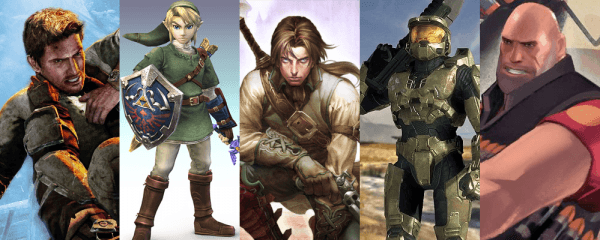
Console and PC exclusives that really put in the effort
The last suggestion I would like to offer is this, specifically aimed at the big three console companies: Microsoft, Sony and Nintendo. Start licensing more exclusives. This is another gripe I have with the XBO and PS4 launches, in that about 14 of the release titles were available on both systems. There’s so little distinguishing the performance of one from the other, and now the software availability is basically the same too. Credit where it’s due to Nintendo, and hence why I’ve felt their console was worth the buy. The Wii U has quite a few really good exclusives both already out, and slated for later release. (I’m particularly looking forward to the release of ‘X’). Increasing exclusivity licensing will encourage developers on all sides of the console wars to only release quality titles that can compete with the expanding market of their rivals. This in turn will encourage independent developers to really innovate creatively so they might be picked up as a Nintendo or Sony exclusive franchise. Now is the time to snatch up those Indie developers while you can, because a pretty big shadow is peaking over the horizon in 2014. As we all know, Indie developers tend to favor online as opposed to physical disc distribution for their games. With the Steam Machines slated for release next year, the direct download market is going to get increasingly competitive, and as such the number of multi-platform releases is going to increase significantly. And where multi-platform releases increase, exclusives tend to decrease. I am eagerly awaiting the arrival of the Steam Machines to see how it might shake up the modern console market. Nintendo already seems pretty well set in terms of their exclusive titles, but if Microsoft and Sony want to break out of this bout of Sequelitis, they’re going to have to start investing in new IP’s, and the traditionally Steam dominated Indie dev scene would be an ideal place to start looking. After all Microsoft, wasn’t it a good idea to pick up Minecraft when you could? Yeah, thought so. Imagine what sort of success the company would get if Sony had picked up a series like Angry Birds exclusively. 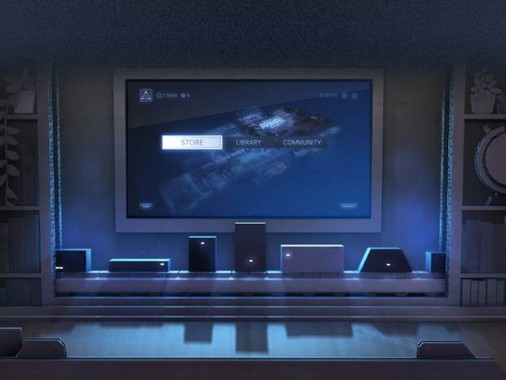
The future is watching you…
Now, you could speculate that any of this might help, or it might just keep things the same as they are now. Ultimately this is an industry that many of us love for its creativity, storytelling and ability to bring a little bit of joy and fun into our lives. Regardless of whether you get that joy from completing a complex puzzle, defeating a difficult boss fight, winning a simulated world cup or blowing the heads off your online rivals, you can’t deny that it gets a little boring doing the same thing over and over. Variety is the spice of life after all, and we don’t want this industry to fall into creative stagnation. It will be our voices and choices that will drive the future direction, not publisher say-so. Is the new generation of gaming suffering from Sequelitis? Undoubtedly, yes. But does it have to stay this way? Not by a long shot.

